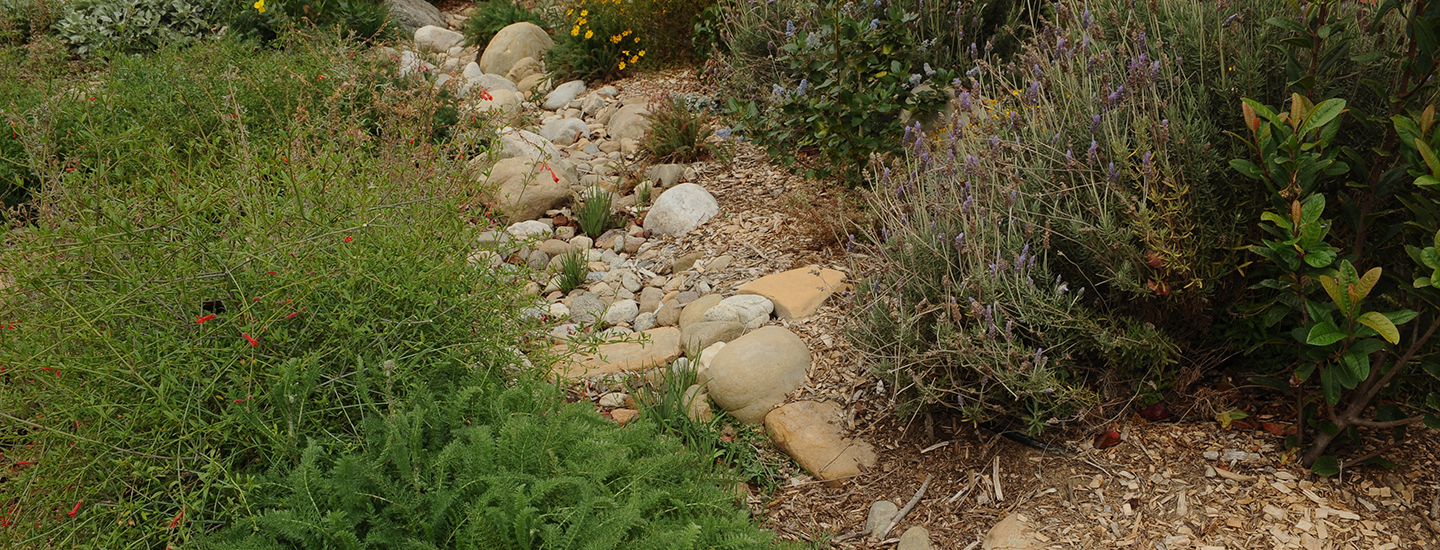
08.13.16
Making the connection between how we care for our yard and the health of our local waterways
By Surfrider FoundationOcean Friendly Gardens: Making the connection between how we care for our yard and the health of our local waterways.
What’s the problem?
Most people have no idea of the connection between how they manage their lawn and gardens at home and the health of our local waterways and beaches.
From unnecessarily treating our garden and lawns with chemical fertilizers and pesticides to applying too much water, we’re killing all the beneficial biology in our soils that support beautiful and healthy plants, and it’s creating polluted runoff. Landscaping chemicals don’t stay where they are applied, but instead can leach into groundwater or be washed away by runoff when it rains or when misdirected irrigation runs off our properties. The resulting storm water and urban runoff pollutes local waterways and harms coastal ecosystems by causing harmful algal blooms and killing fish and other aquatic animals. Water affected by runoff makes it dangerous to swim and play in.
What’s the solution?
The best way to protect our waterways is through a more natural landscape that supports a diversity of native plants, and mimics and supports nature rather than harming it. Instead of maintaining water thirsty turf lawns and adding chemicals to force them to be green, you can take steps to make your yard an Ocean Friendly Garden. And you don’t need to live by the ocean to have an Ocean Friendly Garden. All of our waterways are connected, so it is just as important for inland communities to have Ocean Friendly Gardens.
Ocean Friendly Gardens act like a sponge in your landscape. These gardens are shaped in a natural way to capture rain and runoff, contain native, climate appropriate plants and healthy, living soil which soaks up, stores and filters out pollutants from stormwater and road runoff. They have the added bonus of providing native habitat for bees, birds and butterflies. And it’s an important tool in addressing climate change as healthy plants and soil work in combination to capture and store carbon from the atmosphere. In the most basic terms, Ocean Friendly Gardens can conserve water, help clean up local waterways, and be beautiful and affordable too.
Steps you can take at home to be make your yard more Ocean Friendly:
- Stop using chemical fertilizers and pesticides. Pull your weeds by hand instead.
- Apply organic compost to your yard and garden and cover it with mulch to build healthy, living soil that acts like a sponge to hold onto rain for your plants’ use during dry months. Soil microbes, which are like probiotics, help the soil’s ability to absorb nutrients and resist drought, disease and pests and aid in cleaning up pollution and capturing carbon that plants absorb from the atmosphere.
- Make your own soil amendments by composting your yard and kitchen scraps in a compost or worm bin.
- Plant native plants and grasses that don’t need supplemental irrigation when they are fully-grown. You’ll also be providing food and habitat for butterflies, birds and bees.
- Shape your garden to slow down and soak up rainwater. Leave a natural buffer or slightly raised border around the edge of your yard to prevent runoff from leaving your property and polluting local waterways.
- Direct rain gutters and downspouts into your landscaping to slow down and sponge up rain. This reduces flooding and keeps polluted runoff from reaching the ocean.
- Install a rain barrel to store rainwater for future watering needs, and make sure to direct the overflow into the landscape and not onto the driveway and out to a storm drain.
- Make your walkways and driveways permeable by cutting gaps in them or make sure they are pitched to drain into your yard.
Apply CPR to your yard to protect clean water locally
All the steps listed above lead to an Ocean Friendly Garden by applying CPR to restore the health of all of our waterways and ocean:
Conservation of water and wildlife habitat with native plants;
Permeability by creating healthy, living soil and spaces in hard surfaces to sponge up water and filter out pollution; and
Retention of rainwater in the landscape and to recharge groundwater.
Visit Surfrider’s Ocean Friendly Gardens website to learn more or find a Surfrider Chapter near you to join in and contribute to the protection of our ocean, waves and beaches.
